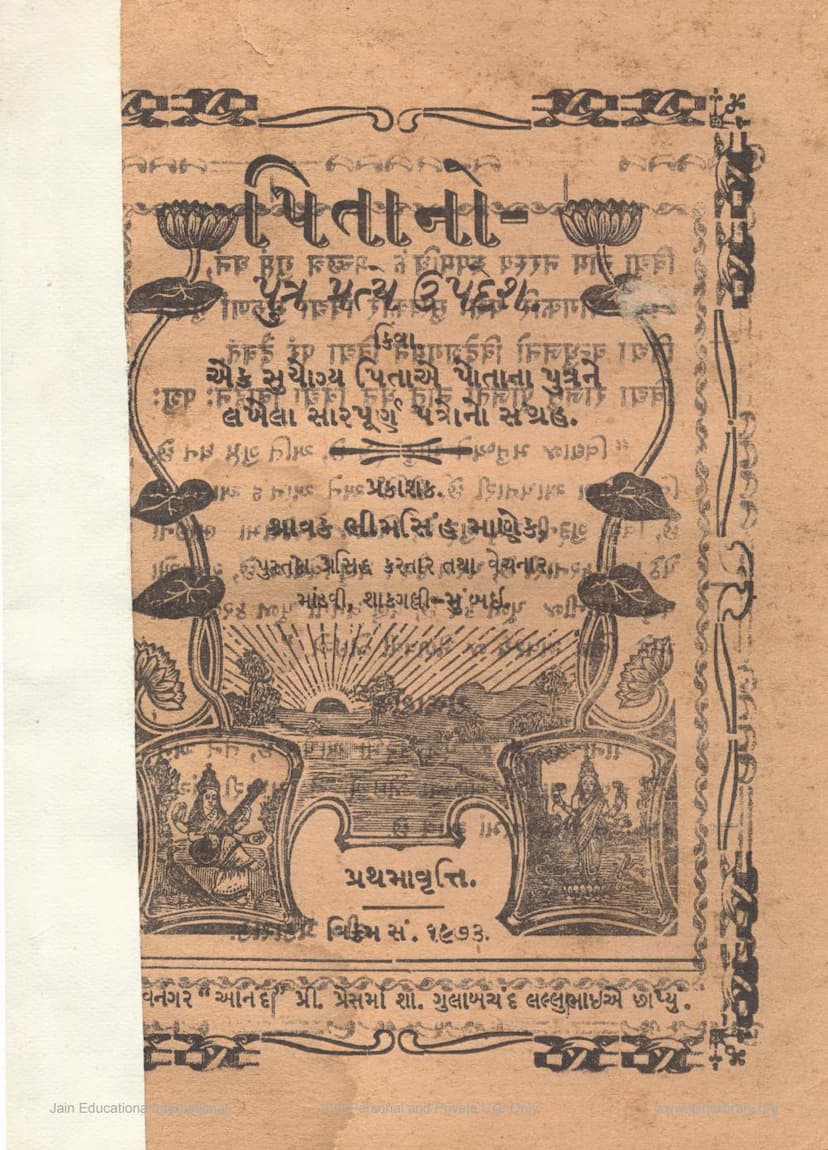Pitano Putra Pratye Updesh
Added to library: September 2, 2025

Summary
Here's a comprehensive summary of the Jain text "Pitano Putra Pratye Updesh" (Advice of a Father to His Son) by Shravak Bhimsinh Manek:
Book Title: Pitano Putra Pratye Updesh (Advice of a Father to His Son) Author: Shravak Bhimsinh Manek Publisher: Shravak Bhimsinh Manek Catalog Link: https://jainqq.org/explore/005383/1
Overall Purpose and Theme: This book is a collection of advice and guidance from a father to his son, specifically aimed at shaping the son's character and ensuring a successful and meaningful life. The advice emphasizes the importance of education, diligence, moral conduct, self-discipline, and the pursuit of knowledge as the foundation for both worldly success and spiritual well-being. It is deeply rooted in Jain principles, advocating for virtues like non-violence, truthfulness, and compassion.
Key Themes and Advice Presented in the Letters:
The book consists of a series of letters from a father to his son, covering various aspects of a student's life and beyond. Here's a breakdown of the core messages:
-
The Value of Education and Diligence (Letters 1, 2, 4, 5, 11, 13, 14):
- Consistent Effort: The father stresses the importance of regular study, creating and adhering to a timetable, and striving to be among the top performers.
- Time Management: He highlights the preciousness of time, urging the son to avoid wasting it on idle talk, gossip, or unproductive activities. Every moment should be utilized for learning and self-improvement.
- Hard Work and Perseverance: The text repeatedly emphasizes the rewards of hard work, stating that effort leads to reputation, satisfaction, and future success. It encourages the son not to shy away from difficulty.
- Self-Study: The father advocates for self-study and deep reflection on lessons learned in school, as this is crucial for true understanding and retention.
- Avoiding Distractions: Students are warned against being overly social or getting involved in activities that hinder their studies.
- Learning from Experience: The father encourages the son to learn from his mistakes and the experiences of others, citing historical examples.
-
Character Development and Moral Conduct (Letters 2, 3, 5, 7, 8, 9, 10, 13, 15, 16):
- Integrity and Honesty: Truthfulness and honesty are presented as fundamental virtues. The son is advised to speak truthfully and act with integrity in all dealings.
- Humility and Modesty: The father warns against pride and arrogance, emphasizing that true greatness lies in humility and acknowledging one's limitations. Boasting about one's achievements is discouraged.
- Self-Control and Discipline: The importance of controlling desires, impulses, and emotions, especially anger, is repeatedly stressed.
- Compassion and Benevolence: The text advocates for extending kindness, compassion, and help to all beings, including those less fortunate. Helping others is seen as a path to personal happiness and a higher purpose.
- Respect for Elders and Family: The father emphasizes the duty of respecting parents and family members and cherishing their sacrifices.
- Seeking Good Company (Satsang): The influence of good company and reading virtuous literature is highlighted as crucial for character building. Conversely, associating with negative influences is warned against.
- Inner Purity: The father stresses that inner purity of mind and heart is more important than external wealth or status for achieving happiness.
-
Practical Life Skills and Financial Prudence (Letters 8, 10, 13, 16):
- Frugality and Saving: The importance of living within one's means, saving money, and avoiding extravagance is strongly advised. This is seen as a practical necessity for navigating life's uncertainties.
- Financial Responsibility: The son is encouraged to understand the value of money, earned through honest means, and to use it wisely.
- Self-Sufficiency: The ideal is for individuals to be self-reliant and contribute positively to society, rather than being a burden on others.
- Career Choice and Professionalism: The father discusses the importance of choosing a suitable career, excelling in one's profession through hard work and integrity, and the growing importance of English language proficiency.
-
Spiritual and Philosophical Outlook:
- Gratitude to God: The text encourages gratitude towards the divine for blessings received.
- Repentance and Self-Correction: It emphasizes the importance of reflecting on one's actions, repenting for mistakes, and resolving to do better.
- The Purpose of Life: The overarching message is that life is an opportunity for growth, learning, and contributing to the well-being of others, ultimately leading to spiritual progress.
Notable Examples and Analogies:
- Richard Wellington (Letter 11): The story of Richard Wellington, an orphan who rose from poverty to become the Lord Mayor of London through his diligence, honesty, and perseverance, serves as a powerful example of how virtue and hard work can lead to great success.
- The Value of Knowledge: The book begins with a Sanskrit verse (Page 2) extolling the virtues of knowledge, calling it a person's true beauty, hidden wealth, source of enjoyment, fame, happiness, and the greatest deity.
- Comparison with Less Fortunate: The father advises the son to compare his situation with those less fortunate to foster gratitude and contentment.
Target Audience and Impact: The book is primarily intended for young students and aspiring individuals, guiding them through the critical formative years of their lives. The father's earnest tone and practical advice are meant to instill discipline, ambition, and moral uprightness, ensuring they become responsible and virtuous members of society and achieve both worldly and spiritual fulfillment. The publisher hopes that readers will benefit from this advice, just as the recipient of the original letters did.